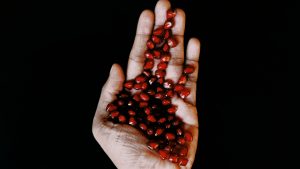Demeter's Daughter
A beautiful meditation to celebrate the springOnce upon a time, a long, long time ago, but also last week, next year, and yesterday, Hades dragged Persephone down into the underworld. He took her at springtime while she admired the beauty of the daffodils.
Her mother Demeter searched for her. Persephone’s friends searched for her. They searched near and far, high and low. No one had any idea of what had happened to her, except Hekate, who had heard the loud crash as the earth had opened to let Hades ride up to the land of the living. Hekate held her torches high to help with the search, leading Demeter through the darkness of grief.
Demeter is the goddess of grain, of abundance, of bounty. While she searched, she would not let any crops grow. No fruit grew on the trees, no grain grew in the soil. Nothing. All was bleak, all was barren, and the people began to grow hungry.
They stopped making their offerings. Why should they? The Gods were letting them starve!
So now, Zeus, King of Olympus, driven more by ego than compassion, sent Hermes, the messenger of the Gods, to find out what had happened to Persephone.
Hermes travelled fast, and before long, he found Persephone in the Underworld. She was unhappy. She missed her mother and she missed the land of the living.
Hades had tried to comfort her but to no avail. He did not wish her unwell, and dearly hoped she would be able to see the beauty of the Underworld as he did. He offered her sumptuous meals, all her favourite foods, hoping to tempt her to eat a little to restore her cheer. She resisted however, as she knew enough to know that if she ate here, she may never be able to return home.
Finally, he persuaded her to eat just a few pomegranate seeds. Surely such a small enough amount would be safe? she thought.
Alas, with those seeds, Hades had sealed her fate!
Hermes wished to take Persephone home to her mother, but Hades refused. She had eaten in the Underworld, so this was her home now. Zeus, on hearing the news, supported his brother.
The other Gods wanted to receive offerings again. They felt sad for their starving devotees and wanted them to be happy. They pleaded with Zeus to work against his brother.
Hermes returned to the Underworld, but this time to negotiate. He proposed a compromise. As Persephone had eaten there, she must stay at Hades’ side. However, as she had eaten so little, she may return to her mother for some of the year, returning to the Underworld for as many months as seeds she had eaten.
Persephone was accepting of this and was lead from the Underworld by Hekate, again shining the light of her torches to guide the way. She returned as promised at Autumn, thus beginning a cycle that continues to this day.
Now she sits proudly in her throne as Queen of the Underworld, finally seeing the beauty around her as Hades does. While she is away, Demeter sleeps, and the leaves on the trees begin to fall, and the crops do not grow, and all is still until the springtime when Demeter awakes to greet her daughter again.
A Springtime Meditation
Close your eyes
Be comfortable
And work with your breath
And reflect upon the words of the story you have just read.
Are there times in the Underworld for you?
Some are positive – time for reflection, for peace and thought
But are some negative times?
Times of enforced darkness, of responsibility stopping you from doing what you wish, times of others’ perception of you holding you back.
Some of these things may have to accept their place at Hades side, some may be unavoidable.
But what can you bring back into the light for yourself? What negative self-talk can you change? What self-doubts can you challenge?
What could you return to yourself?
Enjoy the thought of the abundance that could come back to you. The extra light that you could see return into your life. The joy.
Make plans reflecting the abundance of springtime all around you right now.
______________
And open your eyes
Journal your thoughts and your plans for your creative times ahead. Light a candle as you write to symbolise the returning light of Spring.

